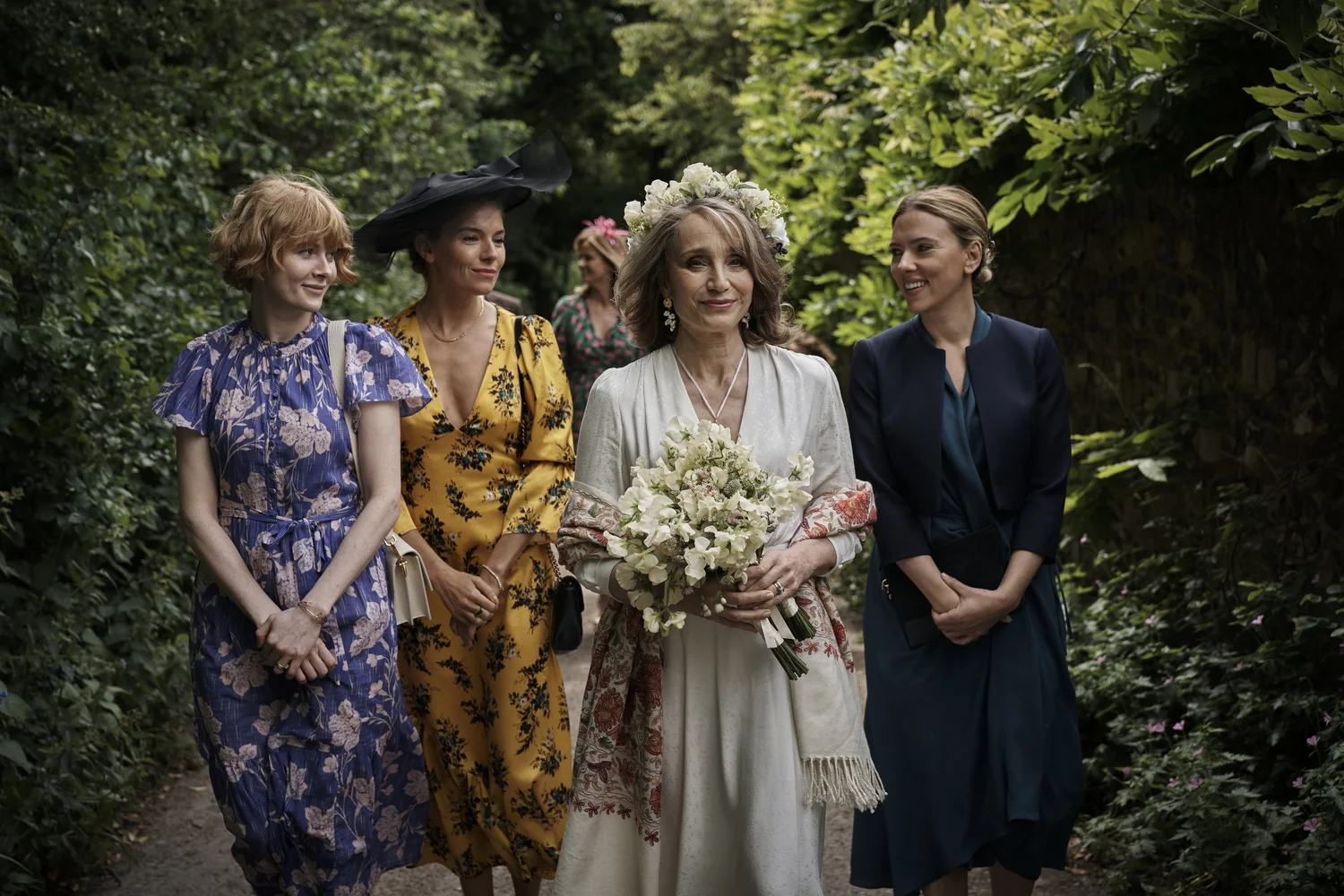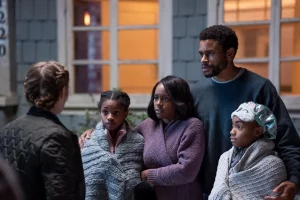MY MOTHER’S WEDDING— 2 STARS
It’s fairly safe to say everyone loves a good wedding movie. From Father of the Bride and Four Weddings and a Funeral to the likes of The Wood and Wedding Crashers, getting swept up in the stylish pageantry, big or small, and the doting affection grabs audiences consistently and well. Curiously, My Mother’s Wedding unfurls as a dramedy where the nuptials in question might be the most inconsequential part of the movie. That’s not a bad thing, as it has happened before in celebrated wedding movies, so long as the film has more to say or is interesting elsewhere. Actress Kristen Scott Thomas’s directorial debut generously tries its hand at offering more than just pure ceremony.
The English Patient Oscar nominee plays Diana Munson, a retiree set to walk down the aisle for the third time. Now north of 60, she is a two-time widow. Both her first and second husbands were British Royal Navy pilots who tragically died in their thirties in flying accidents, serving their country. Their deaths left three daughters for Diana to raise alone. With her girls now grown up with families of their own, it has taken Diana a long time to find new comfort, this time with the modest fellow retiree Geoff Loveglove (Kristin’s Four Weddings and a Funeral co-star James Fleet). A simple wedding is happening at the historic St. Mary’s Church, Ashley, near the family’s country house in southern England’s Hampshire County.
My Mother’s Wedding brings home Diana’s three daughters, all coming from different walks of life and carrying mixed feelings towards this occasion. The flashiest is the middle daughter, Victoria Munson (American Sniper’s Sienna Miller), a famous and very available film actress, who often vaunts her rural, single-parent family upbringing for audience sympathy. The meekest is Georgina Munson (Emily Beecham of Cruella and Daphne), a caretaker trapped in a loveless marriage to the habitual cheater Jeremy (Joshua McGuire of About Time).
The last and oldest of Diana’s children is the steady glue of the trio and the one bringing the most personal pride and contemplation to the event. Playing Kristin Scott Thomas’s on-screen daughter for the third time (after 1998’s The Horse Whisperer and 2008’s The Other Boleyn Girl) in her career, the top-lining Scarlett Johansson (trying to flex a British accent) is Katherine Frost, a high-ranking commander in the Royal Navy. In following in her father and stepfather’s footsteps, she is slated to become the first female captain of an aircraft carrier, the HMS Prince of Wales, after the weekend wedding. Though she is away for months at a time, Katherine is married to Jack (Slumdog Millionaire’s Frieda Pinta), with whom she shares a son, Marcus (Fflyn Edwards of Venom: The Last Dance).
LESSON #1: THE MEMORIES OF CHILDREN OF WIDOWS— All three women, now in their forties, still cling to the nostalgic ideals of their lost fathers almost for no good reason. As the oldest, Katherine never took the Munson name and has the most memories of them. Coming back to the family homestead churns up many reminiscent asides. Rather than cast additional or younger actors for flashback scenes, My Mother’s Wedding employs animated interstitial sequences created by Reza Riahi (The Breadwinner) of Pasteque Productions of cherished childhood moments that often interrupt Katherine’s dreams or train of thought. Unlike children of divorce, death was the separator, creating an aura of nearly immortal regard, something not held as strongly by their mother, who experienced those losses and formative years at a much different age.
LESSON #2: “WHY CAN’T YOU BE HAPPY FOR ME?”— That emotional contrast in My Mother’s Wedding between parent and children brings forth the classic pre-wedding question pushing against disapproval, matching this lesson being implored by Diana. Geoff is the farthest thing from the valiant national heroes Diana’s previous husbands were, leaving him and his name to be seen as lacking and unworthy in the eyes of Katherine, Victoria, and Georgina. However, they cannot be voicing any “why him?” laments if they are asking the very same question for acceptance of their own scattered present life situations. Happiness is always the goal, or at least it’s supposed to be.
My Mother’s Wedding takes several obtuse angles to address its cloverleaf of personal issues. Katherine’s flowing memories and challenges of being absent from Jack and Marcus have made her noticeably melancholy, even with the big naval promotion and jubilant wedding. Victoria is distracted by her stardom, weighing a few potential suitors, and Georgina, in the most daft layer of the movie, is discovering her husband’s sex addiction and confirming his philandering ways, thanks to a private detective (F1’s Samson Kayo) hired by Victoria. As aforementioned, the midday wedding itself and the afternoon tented reception, shot with lovely natural lighting and soft lenses by Brooklyn cinematographer Yves Bélanger, go by virtually incident-free.
All of the hitches of stewing drama don’t surface in My Mother’s Wedding until the evening, when the dynamics of sisterly resentment, old secrets, and individual troubles pile into each other. It takes a pre-honeymoon gravesite visit the next morning, ordered by Diana, to set the girls straight. Displaying strength alongside her senescent radiance, Kristin Scott Thomas wrote herself an exceptional monologue that dispels any parental favor and lays truths out there for all to hear. It is, far and away, the best scene of the entire film.
Penning the My Mother’s Wedding screenplay with her husband, John Micklethwait, the editor-in-chief of Bloomberg News, Kristin Scott Thomas adapted her own family history, including deep roots with the Royal Navy, of losing two father figures before the age of 12. As a director, Thomas created a beautiful space around a crossroads event to allow these female-centered family relationships to lead the way in the ensemble. The squabbles are small, yet are never over-the-top in a backbiting tone for the sake of screwball wedding tropes.
Thanks to the military’s welcome participation in the production, Scarlett Johansson’s character is granted the most resolution of the bunch, which she answers with heavy respect for the position. Her emphasis, unfortunately, leaves too many other threads untied an arm’s length, or more, away. If anything, especially after watching Kristin Scott Thomas rule the big denouement gathering moment, there’s an argument she could have led the entire movie with greater impact. Seeing all this transpire from Diana’s central perspective might have been more interesting in the delicate long run.
LOGO DESIGNED BY MEENTS ILLUSTRATED (#1330)



